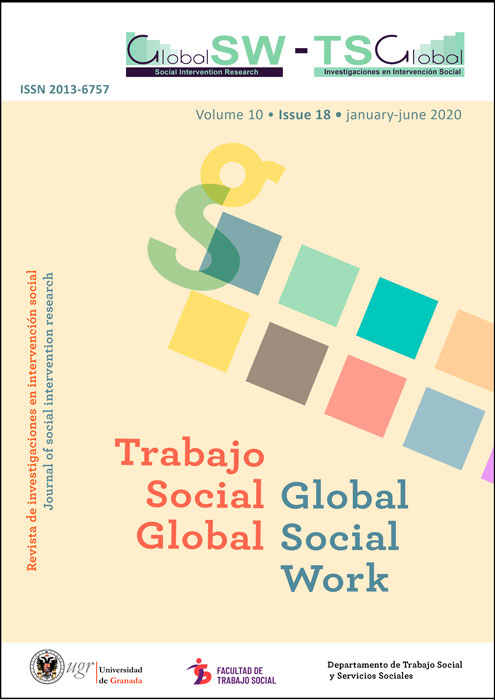Aged-based discrimination from the perspective of human rights or the child: a pending issue in the education of social workers?
DOI:
https://doi.org/10.30827/tsg-gsw.v10i18.11417Keywords:
discrimination based on age, social work, Human Rights, Convention on the Rights of the ChildAbstract
Social Work professionals must recognize children as subjects of rights, incorporating them, from a human rights approach, to their main lines of work. In the research carried out, we focused on the perception on discrimination against children of the students from the degree of Social Work of the University of Huelva. In this study, we have based on the four types of age-based discrimination proposed by Manfred Liebel (for unwanted behavior; for protection; for restricting access to services and also intergenerational discrimination) in order to know to what extent the Social Work students recognize different manifestations of discrimination against children and the general knowledge of these of the rights of the child population. The results show a low awareness of the Convention on the Rights of the Child (CRC) as well as a low sensitivity towards some of the forms of discrimination against the child population, data that tend to improve significantly in the third year and which advise improving the quantity and quality of compulsory training in the field of child rights in the university training of social workers.
Downloads
References
Casas, F. (2010). Representaciones sociales que influyen en las políticas sociales de infancia y adolescencia en Europa. Revista Interuniversitaria de Pedagogía Social, 17, 15-28. Doi: https://doi.org/10.7179/PSRI_2010.17.02
European Commission (2012). Special Eurobarometer 393: Discrimination in the EU in 2012. Wave EB77.4 – TNS Opinion & Social. Recuperado de https://ec.europa.eu/commfrontoffice/publicopinion/archives/ebs/ebs_393_en.pdf
Ferreira, J. M. L. (2016). Un análisis crítico de la investigación cuantitativa y cualitativa en el trabajo social en la promoción del conocimiento de la ciudadanía de la infancia. En Antonia Picornell-Lucas y Enrique Pastor Seller (Coords.). Políticas de inclusión social de la Infancia y la Adolescencia (pp. 259-270). Salamanca: Grupo 5.
Flasher, J. (1978). Adultism. Adolescence, 13(51), 517-523.
Gaitán, L. (2014). De “menores” a protagonistas: los derechos de los niños en el Trabajo Social. Madrid: Editorial Impulso a la Acción Social - Consejo General del Trabajo Social.
Illescas, M.I. (2015). El desafío de un trabajo social comprometido con los de¬rechos de la infancia. Un ejemplo de activismo: Lewis Hine. Trabajo Social Hoy, 74, 7-16. Doi: http://dx.doi.org/10.12960/TSH.2015.0001
International Federation of Social Workers (2002). Social Work and the Rights of the Child: A Professional Training Manual on the UN Convention. Berna (Suiza): IFSW. Recuperado de http://cdn.ifsw.org/assets/ifsw_124952-4.pdf
Kamerman, S. & Gatenio-Gabel, S. (2014). Social Work and Child Well Being. En A. BenArieh et al. (Eds.). Handbook of Child Well Being (pp. 403-413). New York: Springer.
LeFrançois, B.A. (2014). Adultism. In: Thomas Teo (Ed). Encyclopedia of Critical Psychology. New York: Springer.
Liebel, M. (2013). Niñez y Justicia Social: Repensando sus derechos. Santiago de Chile: Pehuén Editores.
_______ (2015). El adultismo y la discriminación por edad contra los niños. En Dagmar Kutsar y Hanne Warming (Eds.). Los niños y la no discriminación: libro de texto interdisciplinar (pp. 125-151). CREAN- University Press of Estonia.
Liebel, M., Luhamaa, K., y Gornishef, K. (2015). El Derecho a la No Discriminación: las bases y conceptos de los Derechos Humanos. En Dagmar Kutsar y Hanne Warming (Eds.). Los niños y la no discriminación: libro de texto interdisciplinar (pp. 13-30). CREAN- University Press of Estonia.
Lima Fernández, A. (2016). Definición Global del Trabajo Social de Melbourne 2014. Revista de Treball Social. Col•legi Oficial de Treball Social de Catalunya, 207, 143-151.
Naciones Unidas (1989). Convención sobre los Derechos del Niño. Nueva York: Naciones Unidas.
Naciones Unidas, Comité de Derechos Humanos (1989). Observación General nº 18: No discriminación. Aprobada en el 37º período de sesiones (10 noviembre 1989). Recuperado de https://www.acnur.org/fileadmin/Documentos/BDL/2001/1404.pdf
Naciones Unidas (1989). Convención sobre los Derechos del Niño. Nueva York: Naciones Unidas.
Rojas Lambertini, M. y Suárez Manrique, P. (2018). Aportes a la reflexión metodológica del Trabajo Social con la infancia vulnerable desde la doctrina de protección integral: De la formación académica al ejercicio profesional en Chile. Análisis, 14(1), 41-61. Recuperado de https://revistas.upr.edu/index.php/analisis/article/view/13447
Reynaert, D., Bouverne-De Bie, M. & Vandevelde, S. (2010). Children’s rights education and social work: Contrasting models and understandings. International Social Work, 53(4), 443-456. Doi: https://doi.org/10.1177%2F0020872809355367
Rodríguez Pascual, I. (2007). Para una sociología de la infancia: aspectos teóricos y metodológicos. Madrid: CIS.
Rodríguez-Pascual, I. y Morales-Marente, I. (2013) ¿Cuántas veces dejamos de ser niños? Un análisis de la representación social de la autonomía infantil. Revista Española de Investigaciones Sociológicas, 143, 75-92. Doi: http://dx.doi.org/10.5477/cis/reis.143.75
Roose, R. & De Bie, M. (2008). Children's rights: a challenge for social work. International Social Work, 51(1), 37-46. Doi: https://doi.org/10.1177%2F0020872807083914
Downloads
Published
How to Cite
Issue
Section
License
Authors publishing in this journal agree to the following terms:
- Authors retain their copyright. They guarantee to this journal the right to a first publication of the work submitted to initiate the editorial process.
- Authors know that their work is published under a Creative Commons License which allows others to share it, with a recognition of the work's authorship and its initial publication in this journal.
- Authors share with Global Social Work explotation rights of the work that has been published in this journal, authorizing the execution of a free reproduction, distribution and public communication. Authors know that their work will be stored on servers and reproduced in digital format for inclusion in institutional repositories and databases that will facilitates free access to the full text of the work.
- Authors may distribute the version of the work published in this journal (for example, to an institutional repository or publish it in a book), with the explicit acknowledgment of its initial publication in this journal.
Copyright on the texts published in Trabajo Social Global -Global Social Work, as well as editorial policy of the journal refering to self-file and deposit in institutional or thematic repositories, are identified in the database





















